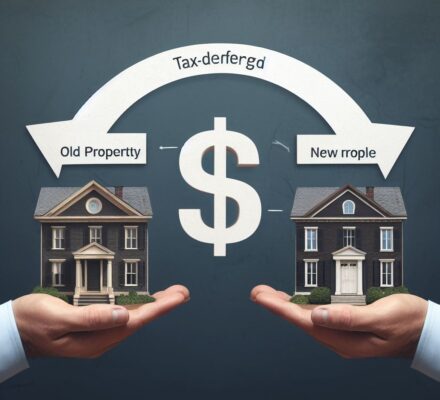Are you ready to debunk the biggest myth about avoiding gain in a 1031 exchange? Well, hold onto your hats because we’re about to reveal the truth.
Contrary to popular belief, the gain in a 1031 exchange cannot be entirely avoided. But don’t fret just yet, because there are strategies you can employ to minimize that gain and maximize your tax benefits.
So, let’s dive into the world of 1031 exchanges and uncover the secrets to optimizing your investment.
Key Takeaways
- Gain in a 1031 exchange cannot be entirely avoided
- Continuously engaging in 1031 exchanges does not defer capital gains tax indefinitely
- Like-kind exchanges do not guarantee the avoidance of gain
- Cash or non-like-kind property received in the exchange may be subject to immediate taxation
The Gain in a 1031 Exchange Cannot Be Avoided
You can actually avoid the gain in a 1031 exchange by carefully following the rules and guidelines. One common misconception is that gain is inevitable in a 1031 exchange, but that isn’t true. The purpose of a 1031 exchange is to defer the recognition of gain, allowing you to reinvest your proceeds into a like-kind property and continue growing your investment without immediately paying taxes on the gain. To achieve this, you must reinvest all of your proceeds into a property of equal or greater value and follow the strict timeline set by the IRS.
By properly identifying replacement properties within 45 days and completing the exchange within 180 days, you can successfully defer the gain. Furthermore, if you invest all of your proceeds and acquire a property of greater value, you can potentially avoid paying any taxes on the gain indefinitely. This is a powerful tool for real estate investors to continuously build their portfolio and maximize their returns.
However, it’s important to be aware of common misconceptions about gain in a 1031 exchange. Despite the ability to defer and potentially avoid gain, some people mistakenly believe that this means they’ll never have to pay taxes. In the subsequent section, we’ll address these misconceptions and provide a clearer understanding of the tax implications involved in a 1031 exchange.
Misconceptions About Gain in a 1031 Exchange
One misconception to address regarding gain in a 1031 exchange is the belief that it can be completely avoided. While a 1031 exchange does allow for the deferral of capital gains tax, it does not eliminate it entirely. It is important to understand the misconceptions surrounding gain in a 1031 exchange to make informed decisions and optimize the benefits of this tax strategy.
One common misconception is that by continuously engaging in 1031 exchanges, an investor can defer capital gains tax indefinitely. However, this is not the case. Eventually, the investor may decide to sell the property outside of a 1031 exchange, triggering the realization of the deferred gains and the subsequent tax liability. It is crucial to have a long-term plan in place when utilizing 1031 exchanges to ensure that the tax benefits are maximized.
Another misconception is the belief that a like-kind exchange guarantees the avoidance of gain. While a like-kind exchange allows for the deferral of capital gains tax, any cash or other non-like-kind property received in the exchange may be subject to immediate taxation. It is essential to carefully evaluate the terms of the exchange to understand the tax implications fully.
To illustrate these misconceptions, consider the following example:
| Misconception | Explanation | Reality |
|---|---|---|
| Continuously engaging in 1031 exchanges defers capital gains tax indefinitely | While 1031 exchanges allow for deferral, eventually the gains will be realized upon the sale of the property | The tax liability will be triggered |
| Like-kind exchanges guarantee the avoidance of gain | Like-kind exchanges defer capital gains tax, but cash or non-like-kind property received may be subject to immediate taxation | The tax implications must be carefully evaluated |
Understanding the Tax Benefits of a 1031 Exchange
To fully comprehend the tax benefits of a 1031 exchange, it’s important to regularly evaluate the potential gains and tax implications of each transaction. By understanding the tax benefits, you can make informed decisions that can lead to significant financial advantages.
Here are four key tax benefits of a 1031 exchange that you should be aware of:
- Tax deferral: One of the biggest advantages of a 1031 exchange is the ability to defer your capital gains taxes. By reinvesting the proceeds from the sale of your property into a like-kind property, you can defer paying the taxes until you sell the new property.
- Increased cash flow: By deferring your taxes, you have more capital available to invest in a larger or more profitable property. This can lead to increased cash flow and potential for higher returns on your investment.
- Wealth accumulation: Through the power of compounding, the tax savings from a 1031 exchange can help you accumulate wealth over time. By continuously reinvesting your profits into new properties, you can benefit from the growth of your investments.
- Estate planning benefits: A 1031 exchange can also provide estate planning benefits by allowing you to transfer your investment properties to your heirs without triggering capital gains taxes. This can help preserve your wealth for future generations.
Strategies to Minimize Gain in a 1031 Exchange
To minimize gain in a 1031 exchange, consider implementing strategic tax planning strategies. These strategies can help you maximize the benefits of the exchange while minimizing your overall tax liability.
One key strategy is to carefully choose your replacement property. By selecting a property with a lower cost basis than your relinquished property, you can reduce your potential gain and therefore your tax liability.
Additionally, you can consider structuring your exchange as a multi-property exchange, which allows you to exchange a single property for multiple replacement properties. This can help spread your gain across multiple properties, potentially reducing the taxable gain on each individual property.
Another strategy is to utilize a reverse exchange, where you acquire the replacement property before selling your relinquished property. This can provide you with greater flexibility in finding and acquiring the right replacement property, and can also help you avoid potential time constraints that may arise in a traditional exchange.
Lastly, it’s important to consult with a qualified tax professional who specializes in 1031 exchanges. They can guide you through the process and help you identify and implement the most effective strategies for minimizing your gain and maximizing your tax benefits.
Debunking the Biggest Myth About Gain in a 1031 Exchange
Now let’s debunk the biggest myth about gain in a 1031 exchange and clarify the truth for you. There’s a common misconception that by participating in a 1031 exchange, you can completely avoid paying taxes on the gain from the sale of your property. However, this isn’t entirely true. While a 1031 exchange allows you to defer the payment of taxes, it doesn’t eliminate them altogether.
Here are the facts you need to know:
- Gain is deferred, not eliminated: In a 1031 exchange, the gain from the sale of your property is rolled over into a new property. This allows you to defer paying taxes on the gain until you sell the new property.
- Basis adjustment: When you acquire a new property through a 1031 exchange, your tax basis is adjusted. This means that the gain you deferred from the sale of your old property will be factored into the basis of the new property. So, when you eventually sell the new property, you’ll still have to pay taxes on the deferred gain.
- Depreciation recapture: If you have claimed depreciation on your old property, you may be subject to depreciation recapture taxes when you sell the new property. This means that a portion of the gain from the sale will be taxed at higher rates.
- Consult with a tax professional: To fully understand the tax implications of a 1031 exchange and make informed decisions, it’s crucial to consult with a tax professional who specializes in real estate transactions. They can guide you through the process and help you maximize the tax benefits while staying compliant with the IRS regulations.
Frequently Asked Questions
What Is a 1031 Exchange and How Does It Work?
A 1031 exchange is a tax-deferred strategy used to swap one investment property for another. It allows you to defer capital gains taxes by reinvesting the proceeds from the sale into a similar property.
Are There Any Limitations or Restrictions on the Types of Properties That Can Be Exchanged in a 1031 Exchange?
When it comes to the types of properties that can be exchanged in a 1031 exchange, there are certain limitations and restrictions you need to be aware of. It’s important to understand these rules to avoid any complications during the exchange process.
Can Personal Property or Assets Be Exchanged in a 1031 Exchange?
You might think you can exchange personal property in a 1031 exchange, but that’s just a myth. The truth is, only certain types of real property can be exchanged, so don’t get your hopes up.
What Are the Potential Tax Consequences if the Gain in a 1031 Exchange Is Not Properly Reinvested?
If the gain in a 1031 exchange is not reinvested properly, you could face potential tax consequences. It’s important to understand the rules and requirements to avoid any unexpected tax liabilities.
Are There Any Time Limitations or Deadlines That Need to Be Followed in a 1031 Exchange Process?
When it comes to a 1031 exchange process, you must be aware of the time limitations and deadlines. Failing to adhere to these crucial rules can result in potential tax consequences.




